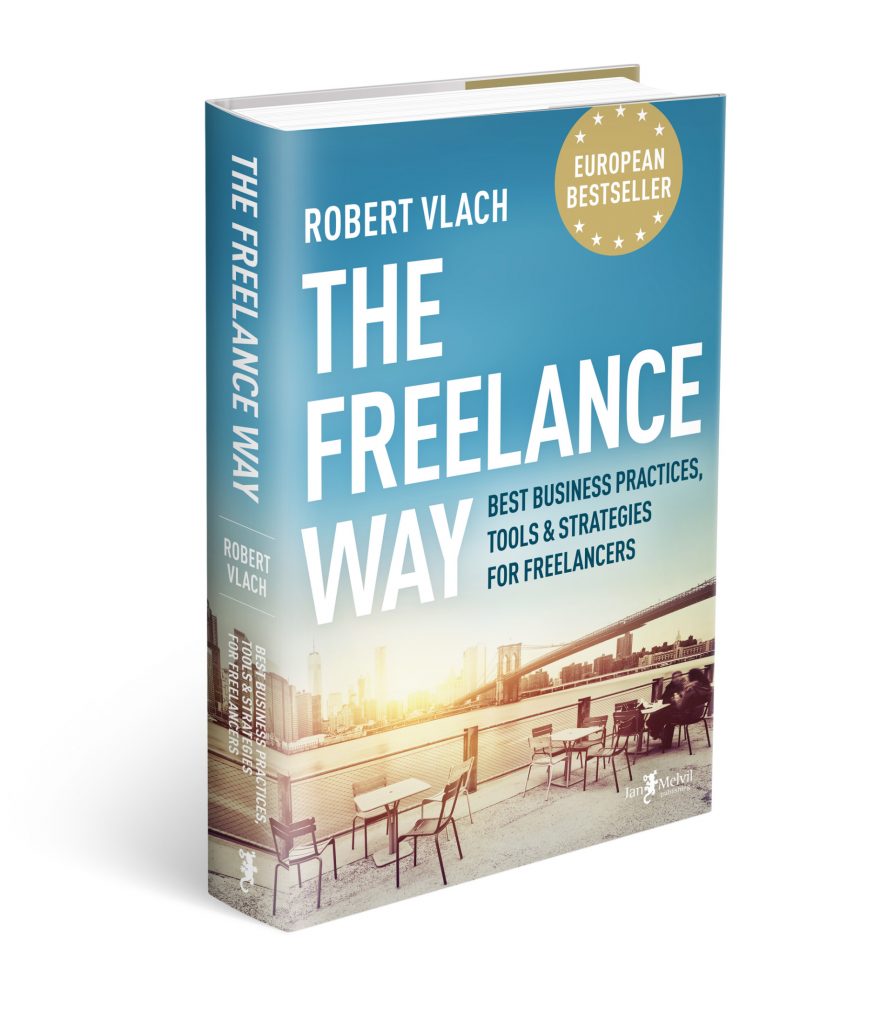Robert Vlach is a business consultant, writer, and freelance entrepreneur and founder of the freelancer community Na volné noze. He is also the author of a new book The Freelance Way, a comprehensive look at the best-business practices, tools, and strategies for freelancers.
We recently asked Vlach to share his knowledge about freelancing in Prague and the Czech Republic with the Expats.cz community:
What is the general situation like for freelancers on the Czech market?
In general, the Czech freelance economy is pretty advanced and Czech freelancers are doing well. Unlike less developed freelance markets, Czech freelancers tend to cooperate, network, share business know-how, team up, and are becoming more professional over time. If they have expertise or skills in demand, it enables them to charge higher rates and land important, well-paid gigs.

Czech clients, meanwhile, don’t have a problem with delegating expert work to established independent professionals. The single most important idea here is that freelancing requires both expertise and business skills to be successful. However, there are also many skilled experts who suck at doing business.
That’s why I started supporting the Czech freelance community in 2005 and wrote The Freelance Way in the first place. Nowadays, freelancers on the Czech market find it easier to grow, prosper, and develop their own businesses, just like any other entrepreneur would do.
We see a lot of polls suggesting that Prague is a great city for freelancers. True?
I agree. Prague is without question the single best city for freelancers in the Czech Republic and one of the most welcoming ones in Europe. There are a ton of events for freelancers and experts in Prague, as well as over 40 coworking spaces, including major centers like Impact Hub, HubHub, Business Link, and WeWork. Our own data suggest that up to 40% of Czech freelancers live in the greater Prague metropolitan area, which isn’t uncommon for capital cities in Europe.
For example, IPSE’s survey Exploring the UK Freelance Workforce in 2016 states that a full 43% of British freelancers are situated in southeastern England and half of these live in Greater London. While Prague isn’t London, in terms of freelancing, it’s not that far behind. There are also a great number of foreign freelancers in Prague, working freelance for the international market and benefiting from the lower cost of living. A freelancing expat can live and work here for years without ever dealing with Czech clients. There is also a growing number of international companies opening up offices and divisions in the Czech Republic.
Which local industries are the most lucrative for and most frequently hire freelancers?
The top contenders would be the IT sector and its related professions, digital marketing, senior consulting, training in companies, business support, and development, trades and construction, law and real-estate (though these are more accessible for the locals). Quite popular, but slightly less well-paid, would be graphic design, creative and media professions, personal services, education, writing, and language services.
But the income differences even within these fields are pretty big and if a freelancer is skilled both as an expert and a businessperson, they may be earning well above the average income. For example, I know freelance graphic designers who earn 100,000–150,000 CZK ($4,000–6,000) per month, which is way above their agency peers.
How do you break into the freelance market if you are new to the scene?
I would suggest joining (or at least following online) our freelance community Na volné noze. Another recommendation would be to become a member in two or three of the larger coworking spaces that are popular with freelancers like the Locus Workspace (run by an expat), Impact Hub, Opero, Work Lounge or Paper Hub, just to name a few popular options. And obviously, networking with other expats through communities like Expats.cz would also be beneficial.
How important is language — which languages are essential for freelancers in Prague?
In general, speaking Czech is essential only in approaching the general public with your services. In business, speaking English is standard, just as it is anywhere else in Europe. Yet if you only speak English, this may narrow your possibilities and options slightly when dealing with some Czech companies, where speaking English might be a challenge. Knowledge of French, Russian, Spanish or other world languages is pretty uneven among the Czech population, so I wouldn’t rely exclusively on these to do business in general, though for a specialist or a single-client contractor this may prove to be just fine.

What is the best way to look for English-language freelance job opportunities?
Let me turn this question around by saying that good freelance jobs are not ones that are simply “found”. Successful freelancers are much more active than that! They proactively create job opportunities for themselves as well as for others — by building relationships, by presenting their work online and offline, by approaching prospects, and by being active in freelance, professional and coworking communities. According to surveys, social bonds, weak and strong, online and offline, are by far the most important source of business opportunities for freelancers.
Browse through thousands of the latest open job vacancies in Prague and the Czech Republic from our trusted partners at Expats.cz Jobs.
This is precisely why we as freelancers need to approach our marketing differently than a company or a startup. It is also very easy for a freelancer to be fully loaded with low-paid work because an individual has a limited production capacity. That’s why freelancers usually have to prioritize the quality of gigs over their quantity. The best freelancers are experienced businesspersons who take on fewer, but higher-quality jobs, after establishing themselves through smart personal marketing and gradually building their good name.
Any other tips for finding freelance work on the Czech market?
As I’ve said, for freelancers, the good work is where good people are — both your colleagues and clients, as well as prospects. Sure, it may take a while to stumble upon interesting opportunities, but for a freelancer one or two of them is often enough to launch a promising freelance career, even if it is initially only through gigs and side jobs. Besides the tips I have already mentioned, I would suggest having a solid online presence, which means having at least a single-page web presentation plus a trustworthy social media presence.
These will definitely help you approach the types of professionals you want to meet or partner with in the future. Consider also joining one of the major professional communities for your field (here, you can hire myTimi.cz to do the research for you) as well as groups dedicated to supporting not only freelancers but entrepreneurs in general. There are also support platforms for businesswomen like Holky z marketingu or Podnikavá žena.
Which cafes in Prague are best for freelancers?
I’m a quality-coffee maniac, so I’m definitely biased towards the ones that serve really great coffee, like Bitcoin Coffee in Paralelní Polis, Ema espresso bar, Café Lounge, Vnitroblock or Kavárna co hledá jméno. And if you go to Brno, you have to visit the one and only Industra Coffee, as well as Cokafe Dolní Vítkovice in Ostrava. These are my favorites.
What are some of the pros and cons of being a freelancer in the Czech Republic?
These came out pretty clear in the survey of 2,300 Czech freelancers I mentioned earlier. The major pros were: 1) flexibility and freedom, 2) doing what I enjoy, 3) being my own boss, 4) independence, 5) working for my own benefit, and 6) earning more money. While the downsides were topped by these cons: 1) income swings, 2) loss of work-life boundaries, 3) irreplaceability, 4) uncertainty and stress, 5) looking for clients, and 6) tendencies towards workaholism.
Let me just amend this by noting, that the top ranks are similar in all advanced freelance economies and that few Czech freelancers mention complicated administration, high taxes, non-payers, or corruption as the dominant problems in their business. These problems exist, but freelancing presents a bit more of a personal challenge, with the major pros and cons being closely tied to one’s personality, and psychological as well as an emotional approach to work and business.
The Freelance Way is published by Melvil. To read an excerpt click here.












 Reading time: 6 minutes
Reading time: 6 minutes 

































